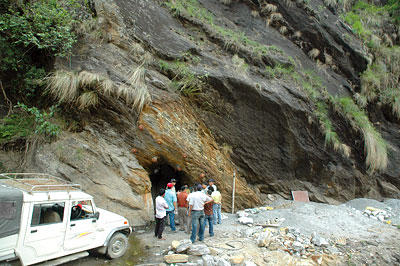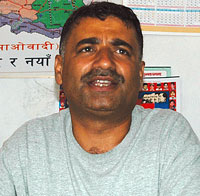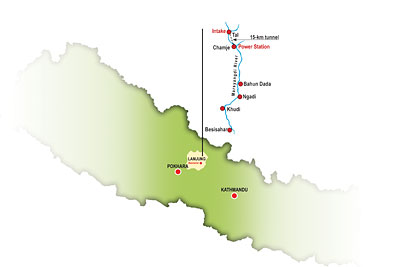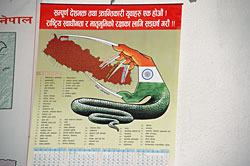 PICS: DAMBAR KRISHNA SHRESTHA STALLED: Project staff inspect the tunnel of the Upper Marsyangdi-II project in Syange, Lamjung |
Maoist threats have stopped preparatory work on a 600 megawatt Indian hydropower joint venture on the Marsyangdi, showing how political instability is affecting infrastructure work on the ground and possibly what lies in store for the country under federalism.
The Rs 70 billion Upper Marsyangdi-II project entails building a 15 km tunnel from Dharapani, Tal Bajar in Manang to the powerhouse in Syange of Lamjung, and is being jointly built by India's GMR and the Nepali company Himtal Hydro.
When completed in five years it will export electricity to India and also provide power to Nepal's domestic grid.
 |
However, the preparatory work on the project has been stalled since February by the Maoists as part of their anti-India campaign. Eighty per cent of the detailed project planning had been completed, including a 300 m tunnel to study the geology of the area. Eight engineers and 80 workers have left because of the prolonged deadlock.
The Maoist Tamu Liberation Front closed down work, threatening dire consequences, and the district administration has stood by, helpless. They say the project is 'anti-national' because the electricity will go to India.
"We will only allow large projects like these after the state restructuring commission determines the sharing of natural resources between the centre and federal units," Maoist Lamjung in-charge Devendra Parajuli (pic, right) told us.
However, district leaders of other political parties say the only thing holding things up is the Maoist demand for a payoff before letting the work resume, which GMR and Himtal have denied them.
 |
"This is not about nationalism or sovereignty, its because the company and the Maoists are bargaining about extortion," says Krishna Koirala of the NC. The UML's Jamindra Ghale agrees. He says local all-party meetings have proposed that the work should be allowed to go on because the locals would benefit from jobs, but the Maoists refuse to listen.
Seventy per cent of the population of Lamjung are Gurung and other indigenous people, and the district chairman of the Janjati Federation Khem Jung Gurung says: "The project people are willing to talk, but the Maoists are pursuing their own political agenda at the cost of our development. I don't understand what the Maoists get out of this."
The stoppage of the Upper Marsyangdi-II project mirrors national level political polarisation, and provides an ominous portent of how carving up Nepal into federal units will complicate natural resource exploitation at a time when both water and power have become precious commodities.
Gyanendra Lal Pradhan, coordinator of the FNCCI Hydro Power Development Forum, warns that the Maoist attitude will prove ruinous to Nepal's development. For the Maoists to promise 10,000 MW while they were in government and obstruct work here now doesn't make sense. Development should not have to wait for federalism. After all, whoever lives here will benefit from the project."
 |
If started next year, the project will be completed by 2016, and will provide jobs to at least 3,000 people in that period. The project has helped build 14 km of the Besisahar to Chame road. The 70 megawatt German-supported Middle Marsyangdi project, inaugurated in 2008, was delayed by five years because of Maoist obstruction during the conflict.
READ ALSO:
Heaven to hell
Biogas moves up, Foo Chee Chang
Reviving the river
The age of enlightenment, Ahmad Iskandar
A weathered people, Prawin Adhikari
Revisiting Crapmandu, Rabi Thapa


